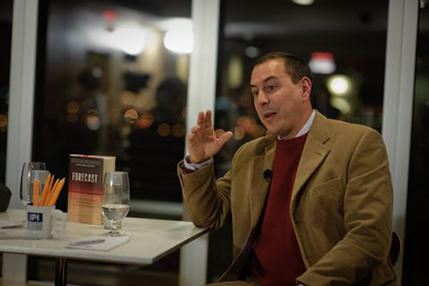
Stephan Faris
On January 22nd, IPI welcomed Stephan Faris, author of the book Forecast: The Consequences of Climate Change, from the Amazon to the Arctic, from Darfur to Napa Valley, who led a discussion on “Climate Change and Conflict.” Warren Hoge, IPI Vice President and Director of External Relations, moderated the event.
The event will be aired on C-SPAN March 1, 2009, at 3pm and 9pm, and on March 2nd at 7am. To view a transcript of the event, click here.
Touching on the impact of climate change on countries as diverse as the Netherlands, Bangladesh, Sudan, and the Maldives, the conversation afforded the audience an inside look at the globally felt impact of changing temperatures. In researching Forecast, Stephan Faris travelled to all continents and brought back a penetrating account of the impact of climate change on African refugee camps, Indian border towns, Mediterranean islands, European cities, Arctic outposts, Amazonian colonies, and seaside towns in the United States. So far, much of the discussion on climate change has focused on distant, catastrophic effects of a superheated world. In his presentation, Stephan Faris reported on changes, from the subtle to the more dramatic, that are already under way.
Highlights from Mr. Faris’ Presentation
- Climate change by itself doesn’t launch wars or rebellions or campaigns of ethnic cleansing and genocide, but it makes populations more vulnerable thereto. According to the Red Cross, environmental disasters already displace more people than war.
- Many people worry that, as we pass the point of two degrees Celsius of warming, we are going to kick off processes that will continue the warming to four degrees or six degrees. Six degrees Celsius is the difference between where we are now and where we were during the last Ice Age.
- Climate change has a long lag period. It takes decades between the time we make gases to when we feel the worst effects. So the effects we’re feeling now, which are still hard to detect and are perhaps not being talked about very much, are the result of emissions that were released during the Kennedy Administration.
- What President Obama seems to have recognized is that, if India and China are ready to eventually do something about climate change, they are not going to do it as long as the US is holding back. He seems to be consciously making it a domestic issue first––we should do this because it’s going to help the US economy, it’s going to make us more secure––and then, the US can say hey, this is what we’re doing, why don’t you guys come on board?
The standing-room-only event was part of Beyond the Headlines, a series of evening receptions hosted by the International Peace Institute for experts from Permanent Missions to the UN and other members of the UN community.
Speaker
Stephan Faris, author of Forecast: The Consequences of Climate Change, from the Amazon to the Arctic, from Darfur to Napa Valley (Henry Holt & Company 2008)
Moderator
Warren Hoge, Vice President and Director of External Relations, International Peace Institute







